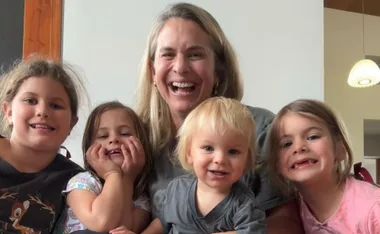Raising the issue of a weight problem can be uncomfortable for anyone, but raising the issue of a child’s weight problem can be fraught with multiple dangers.
At what point does a chubby bubby, or a child carrying a little puppy fat become an issue, and what is the best approach to tackle it?
While the baby growth percentile chart is a very broad guideline it is still a good reference point to work out if your child has an even height to weight ratio or if you have anything to be concerned about.
Mum of three, Angela Cornell’s eldest child, Rachel* is a little on the chubby side but at eight years old Angela doesn’t feel that it’s an issue at this point.
“My concern about my child’s weight is not the overall weight but the fact that for a long time and even through growth spurts she has excess weight on her stomach,” says Angela. “I have had a casual discussion with our health care practitioner who didn’t seem too concerned and simply encouraged us to maintain a healthy diet and to ensure that she gets adequate exercise. We were already doing that but not seeing any changes.”
A few kids have commented on Rachel’s shape, but at this point Rachel just shrugs it off.
“She will occasionally comment about her weight and say” I’m fat” and has only mentioned other kids commenting a couple of times. One family member suggested to her that she needed to go on a diet and her response was “What’s a diet?”
“She is aware that she has a fat tummy but seems perfectly content and I haven’t found her to be self-conscious about it.”
It is a fine balance between managing a child’s burgeoning weight issue and just waiting to see if they grow out of it, but as Sarah*, 36, discovered too much attention on the issue can cause more harm than good.
“The first time I remember realising I was considered chubby was when I was about nine and my slightly older, much more physically and emotionally mature friend pointed out my pudgy tummy,” she recalls. “I also have memories of my mother saying to her friend that my brother could eat whatever he wanted and not gain weight, but that she had to ‘watch’ me.”
Sarah was placed on a calorie controlled diet and as a child with a penchant for maths things soon got out of hand.
“I was always good with numbers so I took on the calorie counting like a project. I learnt to read and understand nutritional labels by the time I was about 10,” she tells. “I didn’t really drop much weight. It became just a part of life to watch calories and think about food. I started hiding treats and sneaking extras.
“When I wanted to lose weight as a 14 year old I already had all the skills and knowledge. It was quite effective. By the time I was 16 I was anorexic.”
Sarah is now fit and healthy, but the microscopic view on eating during her formative years has left a lasting imprint.
If you need to broach the subject of a weight issue with a child, the key is in the approach believes From The Left Field’s child psychologist Dr Sasha Lynn.
“If your child has a weight problem, then you don’t want them to feel that they are defective, or there’s something wrong with them as a person. Often children will personalise things, so if you talk about an issue, they’ll directly associate it with their core being,” she says.
“You must be gentle with the child, looking at other factors impinging on the weight problem and always emphasise that it’s not their issue, it’s a family issue. Let them know that they have your full support and you will work on it together.”
Ensuring everyone has adequate education and support is important when working through an action plan but how can you ascertain when it’s really time to implement a plan rather than treating excess puppy fat as normal?
“When it is impacting on their life in a negative way and has the potential to cause some serious harm, either in the immediate future or further down the track. The harm could be medical, psychological, social,” says Dr Lynn.
Loosely assessing a child’s weight should be happening from the time they are born says paediatric dietician and nutritionist, Hanan Saleh and ideally your GP should be your ally in knowing when you need to take affirmative action.
“Often mums are at the doctors asking unrelated questions about immunisation and focusing in class or whatever it may be. I think the GP is the first point of call by suggesting a child jumps on the scales and looks at the growth chart and then address it to the parents if the child is not matching in terms of percentiles,” Hanan says.
“Once an issue has been identified then doctors can give a few pointers or refer the family on to a paediatric dietician.”
If an issue has been detected then finding out the reason for the extra weight is the best place to start. Although a small amount of cases of overweight children are due to a genetic problem or a medical issue, once these are ruled out we need to look closely at lifestyle.
“Are we sedentary, are the kids watching too much tv and iPad, are they getting out on the trampoline enough? Obviously our eating habits effect too, we’re eating out too much, eating hot chips and icecreams,” says Hanan.
“We play a large part in our child’s weight issue but unfortunately there are some cases where the child might eat exactly the same as their skinny best friend in class but the skinny kid stays skinny and the chubby kids gets chubbier.”
The word “diet” is not encouraged in adults or children any longer but we are turning more towards mindful eating. Mindful eating as an entire family will not only set up better habits for life but also benefit everyone in the home.
“Instead of saying “no you can’t eat that” or “only eat this”, it’s more about learning about what foods are and how much energy there is in a muesli bar compared to an apple and having more of an educated response to snacking and eating and knowing the energy value of food,” says Hanan.
Being organised when you’re out is a great way to be in control so fill up lunch boxes with bananas, rice crackers and drinking yoghurts rather than indulging in fatty foods. Also ensuring your child drinks plenty of water.
“It takes planning and being prepared,” says Hanan.
But this kind of planning creates lifelong habits for better overall health.










.png?resize=380%2C285)
